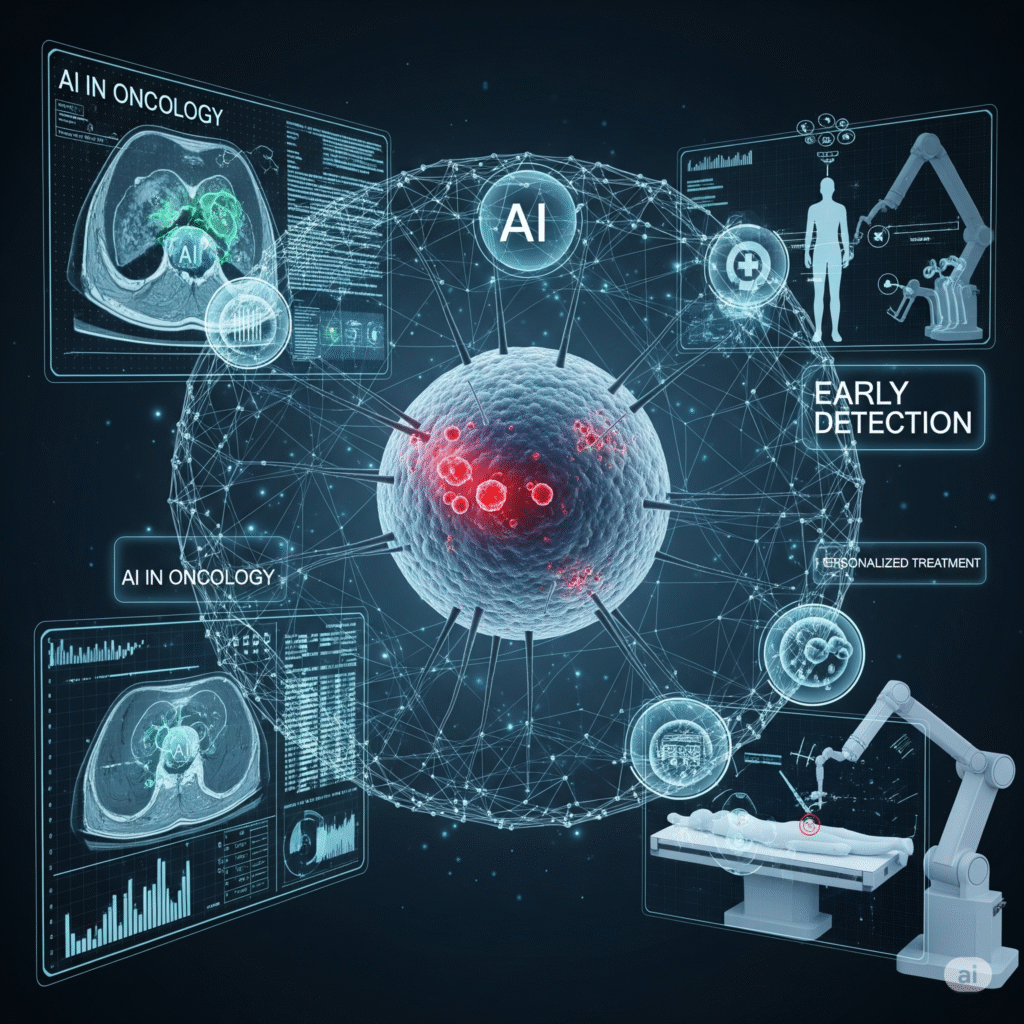When Every Second Counts
Cancer doesn’t wait. It grows quietly, often without symptoms, until it’s dangerously advanced.
But what if we had a tireless ally — one that could scan millions of images in seconds, detect the smallest anomalies, and help doctors make faster, more accurate decisions?
That ally is Artificial Intelligence (AI). And it’s not a futuristic dream — it’s here, working alongside doctors right now.
The Role of AI in Cancer Care
AI in oncology combines machine learning, deep learning, and big data analysis to support every stage of cancer management — from early detection to treatment optimization.
1. Early Detection & Diagnosis
AI algorithms can analyze X-rays, CT scans, MRIs, and mammograms with remarkable precision.
- Example: Google’s AI mammography tool reduces false positives by 5.7% and false negatives by 9.4%, enabling earlier interventions.
2. Personalized Treatment Plans
AI uses genetic, imaging, and clinical data to create tailored treatment strategies, ensuring patients receive therapies with the highest chance of success.
3. Drug Discovery
AI accelerates the discovery of new cancer drugs by predicting how certain molecules will behave — reducing years of research to months.
4. Workflow Automation
From automating pathology reports to optimizing radiotherapy planning, AI reduces doctors’ administrative load so they can focus on patients.

Case Studies: AI in Action
Case 1: NHS AI Skin Cancer Screening
In the UK, the National Health Service introduced an AI-powered app to evaluate skin lesions from photos.
Results: 99.9% accuracy in detecting high-risk cases, with instant clearance for non-threatening moles — saving both time and healthcare resources.
Case 2: Pathology at Singapore General Hospital
Faced with growing workloads, pathologists integrated AI tools that highlight abnormal tissue regions.
Impact: Faster, more consistent slide analysis, enabling quicker treatment decisions.
Case 3: Radiotherapy at Moffitt Cancer Center
AI-assisted radiotherapy planning reduced preparation time from 2 hours to under 30 minutes, allowing more patients to be treated without compromising quality.
How You Can Use AI in Your Day-to-Day Health Journey
Even if you’re not a doctor, you can still use AI to protect your health:
| AI Tool | Benefit | Example Apps |
|---|---|---|
| Symptom Checker Apps | Early detection of warning signs | Ada Health, Buoy AI |
| AI Scan Review | Second opinion on imaging results | Lunit, Qure.ai |
| AI Medical Scribes | Converts doctor visits into notes | DeepScribe, Nuance DAX |
| Screening Reminders | Ensures timely cancer check-ups | MyChart, HealthTap |
A Simple “AI Health Shield” Routine
- Track – Use wearables and health apps to monitor your vitals.
- Check – Run unusual symptoms through a reputable AI symptom checker.
- Verify – Ask your doctor if AI tools are used in your scans or pathology.
- Remind – Let AI schedule your screenings and follow-ups.
- Stay Updated – Read trustworthy health tech sources to keep pace with AI advancements.
The Cost of Ignoring AI
Failing to embrace AI in healthcare could mean:
- Delayed diagnosis
- Missed treatment opportunities
- Higher medical costs
- Reduced survival chances
In the battle against cancer, time is life — and AI helps you win back both.
Balancing AI & Human Expertise
AI is not here to replace doctors but to empower them. The best outcomes come from human judgment + AI precision.
Conclusion: A New Era in Cancer Care
We stand at a turning point. AI is not just a technological upgrade — it’s a lifeline, bringing speed, accuracy, and hope into the fight against cancer.
The question is: will you use it, or risk being left behind?
Disclaimer: This blog is for educational purposes only. Consult a licensed medical professional for diagnosis or treatment.



2 Comments
Pingback: How GPT-5 Enables New Use Cases in Business, Healthcare & Education: Transformative Applications & Best Practices
Your article helped me a lot, is there any more related content? Thanks!